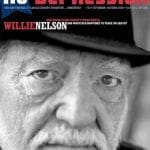Hayden – Introspectively yours
First impressions, our parents tried to teach us, are hard currency in this world. So, too, in the world of music. Who, we wonder, is behind this voice or that lyric? Would we like the artist as a person?
In the case of Canada’s Hayden, what you hear is what you get. I’m betting on someone who’s (a) somewhat fragile and shy, given his quavery singing style, a reedy mumble located midway between Neil Young, Tom Waits and Lambchop’s Kurt Wagner; (b) definitely introspective, prone to wistful, downcast balladry; and (c) blessed with a strong, if often overlooked, darkly humorous streak.
Hayden’s not up for armchair psychology, so he’ll pass on commenting about (a) and (b). Regarding (c), however, he says, “You’re exactly right. I’m like that when I’m hanging out with friends and stuff, and especially on this record — for the first time I’m integrating it into my songs.”
The record is Elk-Lake Serenade, and on it are some altogether unexpected knee-slappers. Both “Killbear” and “Hollywood Ending” involve violent fantasies that get punchline twists in the finales, while the glam-poppy “My Wife” is as spitefully, hilariously paranoid (“You’re looking right at my wife/Like she’s part of the dinner we’re serving you”) as a Harry Nilsson tune.
To date, though, he’s been filed under “M” for Melancholy, alongside such sensitive artistes as Nick Drake, Elliott Smith and Will Oldham — hardly a Friars Club. Now 33, Hayden Desser first appeared on the radar in 1995, when his critically hailed indie debut Everything I Long For sparked a major-label bidding war. After the dust cleared, Geffen subsidiary Outpost set about hyping its lo-fi alterna-troubadour, and for awhile the strategy worked; a re-released Everything and its ’98 follow-up The Closer I Get notched respectable MTV airplay and earned Hayden high-profile tours with everyone from Cowboy Junkies to Guided By Voices.
Then in 1999 Geffen pulled the plug on Outpost, leaving Hayden without a label, and for the next couple of years he was reported as AWOL. Yet to hear him tell it now, getting the news about Outpost wasn’t depressing; rather, he’d felt relieved. The grueling eight-month road trek for Closer had left him so drained that “the last thing I wanted to do was make another record or think about touring,” he explains. So he simply went home, jammed with friends and, with no A&R suits breathing down his neck, wrote songs for himself.
From this downtime emerged 2001’s Skyscraper National Park, privately released on his own Hardwood imprint. Echoing the pattern of six years earlier, critical raves for the album stirred up significant label interest, although this time he went with an independent, San Francisco’s Badman, which re-released Skyscraper in 2002. A double-CD concert set, Live At Convocation Hall, also appeared in ’02, followed by this year’s Elk-Lake Serenade.
Hayden couldn’t be happier. “I could say that the major-label experience was a negative thing for my musical growth and direction,” he admits, “and I think I am the kind of person that would have been better off on a really small label and able to grow at my own pace. But in the end, everything worked out. I’m in a good position now.”
That said, Elk-Lake was overshadowed by sadness. Shortly before Hayden began writing the songs, both of his grandparents died within two weeks of one another. A palpable sense of transition is felt in places, particularly on the title track, a stark solo piano composition whose entire lyric reads, “I can’t believe how one thing changes everything and nothing will ever be the same again.” He sings the line “the same again” two times — once for each grandparent, perhaps.
“To me, the words in that song, they are sort of what this is about, the message of the whole record in a way,” he acknowledges. “It had been a very dark time — in fact, going to visit my grandfather in the hospital led me to having to go into quarantine for SARS for ten days! — and I think some of that dark time comes through in the songs.”
Confirming my initial impressions, in conversation Hayden comes off as both thoughtful and self-deprecating, weighing his responses carefully and injecting deadpan asides. He seems a little fragile, too, but maybe it’s just his extreme soft-spokenness. We talk about images and public personas for a moment, and I comment that, considering some of the panoramic scenes depicted in the Elk-Lake booklet — forests, lakes, rural roadways, mountain vistas — one might take him to be a solitude-craving artist who only ventures into civilization when it’s time to promote a new record.
“Yeah,” chuckles Hayden, who lives in the hardly rustic Toronto and, with a golf game lined up after our interview, isn’t particularly antisocial either. “That’s exactly the image I’m trying to portray.”




